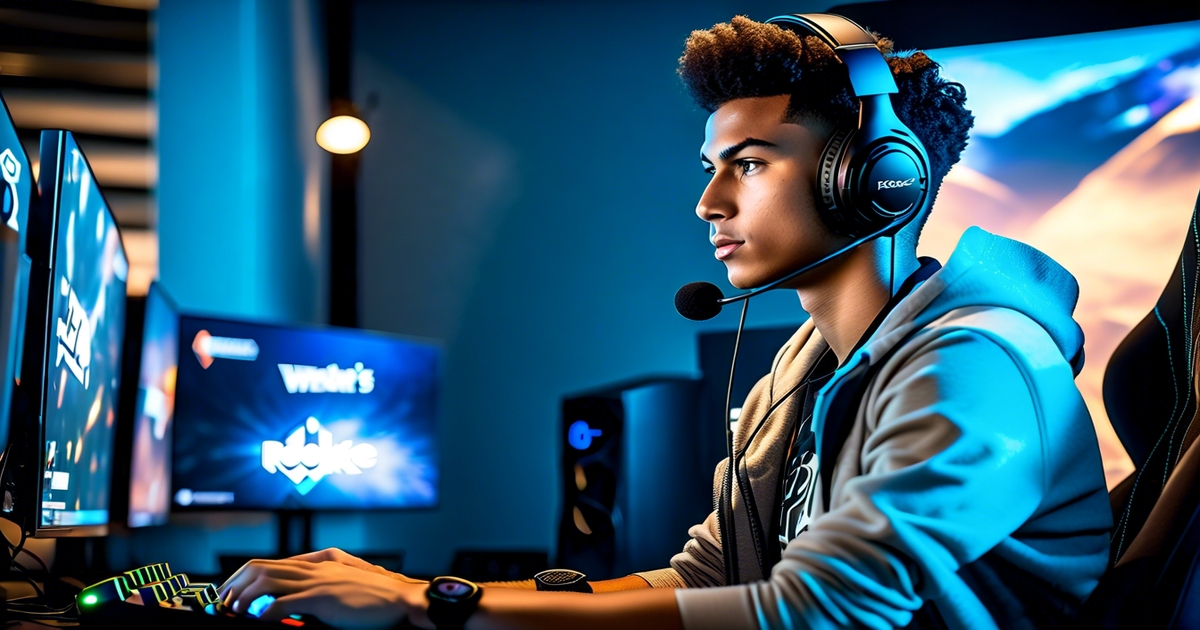Are Gamers Smarter? The Ultimate Answer

- Key Takeaways
- Examining Scientific Research on Gamers’ IQ Levels
- The Relationship Between Gaming and Cognitive Abilities
- Enhancing Problem-Solving Skills Through Video Games
- Video Games’ Influence on Memory and Learning
- Cognitive Development and Skill Acquisition in Gaming
- Role of Video Games in Improving Attention and Focus
- Effect of Video Games on Visuospatial Competencies
- Video Games and Their Impact on Brain Structure
- Final Remarks
- Frequently Asked Questions
Ever wondered if spending hours gaming could actually make you smarter? Contrary to the traditional belief that gaming is a mindless activity, recent research suggests otherwise. Studies show that there various benefits of gaming, especially in terms of intelligence. From enhancing problem-solving skills to improving cognitive abilities, the impact of gaming on intelligence is a topic of growing interest. We’ll explore studies and findings that shed light on this debate and provide insights into how gaming may influence mental acuity.
Key Takeaways
- Scientific research suggests a potential link between gaming and higher IQ levels, but the relationship is complex and multifaceted.
- Video games have the potential to enhance problem-solving skills by providing cognitive challenges and promoting strategic thinking.
- Gaming can influence memory and learning through interactive and engaging experiences, potentially contributing to cognitive development.
- The cognitive demands of gaming may contribute to skill acquisition and the development of visuospatial competencies.
- Video games can play a role in improving attention and focus, as they often require sustained concentration and rapid decision-making.
- While the impact of video games on brain structure is still being studied, evidence suggests that gaming may have an influence on certain areas of the brain related to cognitive functions.
Examining Scientific Research on Gamers’ IQ Levels

Potential Link
Some studies have suggested a potential link between gaming and higher IQ scores. For example, a study published in the journal Nature found that action video games could improve visual attention, spatial ability, and cognitive control. This improvement in cognitive skills could potentially lead to higher IQ scores among gamers. Certain types of strategic or puzzle-solving games may require critical thinking, problem-solving abilities, and quick decision-making—all of which are associated with higher intelligence. Furthermore, research conducted at the University of Rochester indicated that individuals who played action video games made decisions 25% faster than non-players without sacrificing accuracy. These findings suggest that gaming might positively influence cognitive functions related to intelligence.
No Significant Impact
On the other hand, some studies indicate no significant impact of gaming on IQ levels. A meta-analysis published in the American Psychologist concluded that while video game playing is associated with improved visual attention and spatial skills, it does not necessarily enhance overall intelligence as measured by standard IQ tests. Moreover, another study from Stetson University found no direct correlation between adolescents’ video game usage and their academic performance or intellectual abilities. This suggests that while gaming may offer certain cognitive benefits such as improved attention and spatial skills, it might not significantly affect general intelligence levels as measured by traditional IQ assessments.
The Relationship Between Gaming and Cognitive Abilities
Improved Decision-Making and Multitasking
Research suggests that gamers may have improved cognitive abilities, particularly in decision-making and multitasking. When playing video games, individuals often need to make quick decisions based on rapidly changing information within the game environment. This constant demand for decision-making can help improve a gamer’s ability to process information efficiently and make effective choices under pressure. Furthermore, many video games require players to juggle multiple tasks simultaneously, such as controlling a character while keeping track of various in-game objectives. This aspect of gaming can contribute to the development of enhanced multitasking skills. Gamers may become adept at allocating their attention across different activities, which could potentially translate into real-world scenarios where multitasking is essential.
Cognitive Flexibility and Problem-Solving Skills
Certain types of games have been linked to improvements in cognitive flexibility and problem-solving skills. For example, puzzle-based or strategy games often necessitate creative thinking and adaptability when encountering new challenges or obstacles within the game. As a result, regular engagement with these types of games may lead to enhancements in an individual’s ability to approach problems from different angles and devise innovative solutions. Moreover, the interactive nature of gaming encourages active participation in problem-solving processes rather than passive observation. Players are frequently required to analyze situations critically, experiment with various strategies, and learn from both successes and failures during gameplay.
Enhancing Problem-Solving Skills Through Video Games

Promoting Strategic Thinking
Certain video games are designed to encourage players to think strategically and solve complex problems. For example, puzzle-based games like Tetris or strategy games like Civilization require players to think critically and plan ahead. Players may need to analyze different options, anticipate consequences, and make decisions that affect the outcome of the game. This constant engagement with strategic thinking can help develop problem-solving skills in gamers.
Adaptive Problem-Solving Skills
Through interactive gameplay experiences, gamers have the opportunity to encounter diverse challenges that require adaptive problem-solving skills. In a game like Portal, for instance, players must use logic and creativity to navigate through intricate levels using a portal gun. This type of gameplay encourages individuals to approach problems from multiple angles and adapt their strategies based on feedback received within the game environment. As a result, gamers can enhance their ability to tackle unfamiliar situations by applying adaptable problem-solving techniques they’ve honed through gaming experiences.
Video Games’ Influence on Memory and Learning
Enhanced Information Processing
Research suggests that certain video games can actually contribute to improved memory retention and learning processes. When playing these games, the interactive elements engage the brain in a way that enhances information processing. For example, action-based video games often require quick decision-making and strategic thinking, which can stimulate cognitive functions related to memory. These types of video games may involve navigating complex environments, remembering specific details or patterns, and making split-second decisions—all of which can help improve memory retention. For instance, a study published in the journal Nature found that individuals who played action-based video games showed improvements in their ability to track multiple objects at once—a skill directly linked to enhanced memory capacity.
Active Investigation
The impact of video games on memory and learning is an area of active investigation in cognitive psychology. Researchers are exploring how different game genres affect various aspects of cognition such as attention span, spatial awareness, problem-solving skills, and more. This ongoing exploration demonstrates the growing interest in understanding how interactive digital media influences human cognition.
Cognitive Development and Skill Acquisition in Gaming
Cognitive Skills Enhancement
Playing video games can actually help improve certain cognitive skills. When you’re navigating through a virtual world, your brain is constantly processing information, making split-second decisions, and solving problems. This can enhance your spatial reasoning, which is the ability to mentally manipulate objects and understand spatial relationships. For example, in a game like Minecraft, players have to visualize how different blocks fit together to create structures. Gaming also promotes pattern recognition. Many games involve recognizing patterns or sequences to progress through levels or solve puzzles. As a result, gamers tend to develop sharper pattern recognition abilities that can be applied beyond the gaming environment.
Knowledge Acquisition Through Gameplay
Immersive gameplay interactions offer an avenue for players to acquire new skills and knowledge. For instance, in strategy games like Civilization or Age of Empires, players learn about historical events and gain insights into resource management and diplomacy as they navigate through various scenarios. Moreover, role-playing games (RPGs) often require players to engage with complex narratives and make decisions that impact the storyline—a process that nurtures critical thinking skills while expanding their understanding of storytelling techniques.
Ongoing Research on Gaming’s Role in Cognitive Development
Researchers are continually delving into the relationship between gaming experiences and cognitive development. Recent studies have suggested that action video game play may lead to improvements in visual attention tasks such as tracking multiple objects at once—a skill known as “multiple object tracking.” Furthermore, some researchers are exploring whether certain types of video games could potentially be used as tools for cognitive rehabilitation among individuals with neurological conditions such as ADHD or dyslexia.
Role of Video Games in Improving Attention and Focus
Enhanced Concentration
Certain video games have been associated with improvements in sustained attention and focus. When players engage in these games, they often need to maintain a high level of concentration to navigate through challenges, solve puzzles, or make quick decisions. For example, action-packed games like “Call of Duty” require players to stay alert and focused on the screen for extended periods. The immersive nature of video game experiences may demand heightened levels of concentration, potentially enhancing attentional abilities. As players become engrossed in the gameplay, they develop the ability to sustain their focus over prolonged periods. This improvement in sustained attention can extend beyond gaming sessions into real-life situations such as studying or working on tasks that require prolonged mental effort.
Ongoing Scientific Inquiry
The impact of video games on attention and focus is a subject of ongoing scientific inquiry. Researchers are conducting studies to understand how specific game elements influence cognitive functions such as attention and focus. By analyzing the effects of different gaming experiences on players’ cognitive abilities, scientists aim to identify patterns that could lead to the development of targeted interventions for individuals with attention-related challenges. Studies exploring this topic often involve measuring participants’ attentional capabilities before and after engaging with certain types of video games. These investigations provide valuable insights into how gaming experiences can potentially enhance or diminish aspects of cognitive function related to attention and focus.
Effect of Video Games on Visuospatial Competencies
Enhanced Visual Perception and Spatial Awareness
Research suggests that gamers might be smarter due to the positive impact of video games on visuospatial competencies. Playing video games has been associated with the enhancement of visual perception and spatial awareness. This means that individuals who play video games may have better abilities to perceive, analyze, and understand visual information in their environment. For example, action-based video games often require players to quickly process visual information and make split-second decisions, which can improve their ability to visually assess situations in real life. Moreover, immersive virtual environments in gaming could contribute significantly to the development of visuospatial skills. When engaging with complex virtual worlds or navigating through intricate game levels, players are constantly exercising their spatial reasoning and mental mapping abilities. These experiences can translate into improved navigation skills in physical spaces outside of the gaming world.
Ongoing Research
While there is evidence suggesting a positive relationship between playing video games and enhanced visuospatial competencies, ongoing research continues to investigate the specific effects of different types of video games on these cognitive skills. Understanding how various genres or gameplay mechanics influence visuospatial abilities can provide valuable insights into harnessing the potential benefits for educational or training purposes.
Video Games and Their Impact on Brain Structure
Neuroplasticity Effects
Research suggests that certain types of video games can have an impact on the brain’s structure. Specifically, these games may influence regions associated with decision-making and motor control. For example, action video games have been linked to improvements in attention, spatial skills, and cognitive flexibility. These changes in brain structure are attributed to the concept of neuroplasticity, which refers to the brain’s ability to reorganize itself by forming new neural connections throughout life. Video games are a form of environmental enrichment that can lead to structural changes in the brain. Studies indicate that gaming experiences could promote neurogenesis (the formation of new neurons) and strengthen existing neural pathways. This phenomenon is particularly evident in individuals who regularly engage with strategy-based or problem-solving games.
Ongoing Research
The impact of video games on brain structure remains an area of active exploration within the scientific community. Researchers continue to investigate how different genres and gameplay mechanics affect specific regions of the brain. By using advanced imaging techniques such as functional magnetic resonance imaging (fMRI), scientists aim to elucidate the nuanced relationship between gaming and brain plasticity.
- Video games can influence decision-making and motor control areas
- Action video games improve attention, spatial skills, and cognitive flexibility
- Gaming promotes neurogenesis and strengthens neural pathways
Final Remarks
So, are gamers smarter? The scientific research and evidence we’ve explored clearly indicate that gaming can have a positive impact on cognitive abilities. From problem-solving skills to attention and visuospatial competencies, video games have been shown to contribute to cognitive development and skill acquisition. The influence on memory, learning, and even brain structure further supports the idea that gaming can enhance various aspects of intelligence. As you consider the next time you pick up a controller or sit down at your computer for a gaming session, remember that there’s more to it than just entertainment. Embrace the opportunity to challenge your mind and improve your cognitive abilities through gaming. So, level up, embrace the challenges, and keep gaming!
Frequently Asked Questions
Are gamers inherently smarter than non-gamers?
Video games can enhance certain cognitive abilities, but being a gamer doesn’t automatically make someone smarter. Scientific research suggests that gaming may improve specific skills like problem-solving and attention, but intelligence is influenced by various factors beyond gaming.
How do video games impact memory and learning?
Certain types of video games have been linked to improvements in memory and learning. Engaging in strategic or puzzle-based games can potentially stimulate the brain’s ability to retain information and apply it effectively, contributing to enhanced cognitive function.
Can playing video games improve problem-solving skills?
Yes, some studies indicate that regular engagement with certain types of video games can enhance problem-solving abilities. Games requiring critical thinking, decision-making, and adaptive strategies may help individuals develop more effective problem-solving skills over time.
What role do video games play in improving attention and focus?
Select video game experiences have been associated with improved attention and focus. Engaging in fast-paced or complex gameplay can train the brain to maintain concentration for extended periods, potentially translating into heightened attentional control outside of gaming contexts.
Do video games affect visuospatial competencies?
Research suggests that certain genres of video games could positively impact visuospatial competencies. Games involving navigation through virtual environments or spatial reasoning challenges might contribute to the development of enhanced visuospatial abilities.
